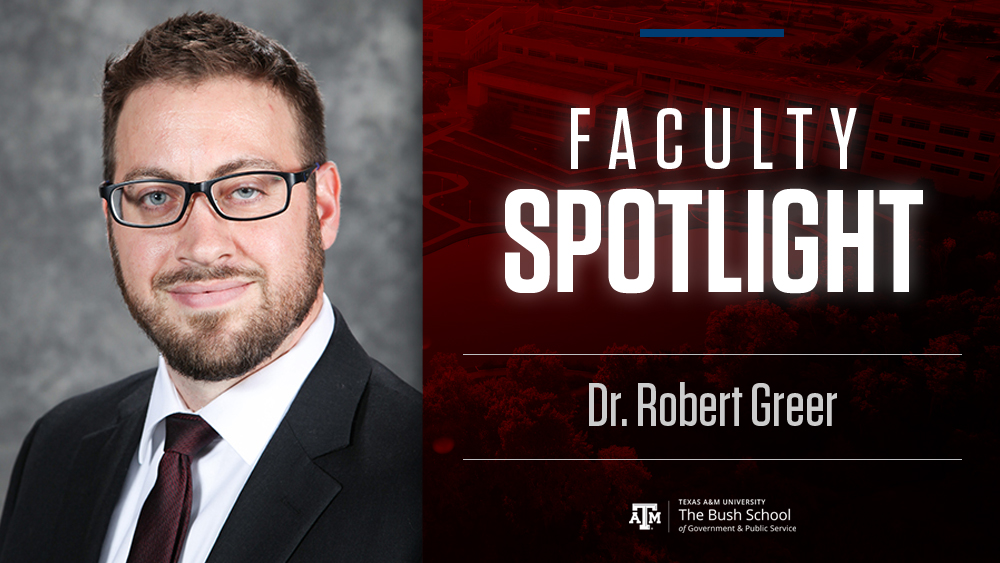
Dr. Robert Greer is possibly the only man on earth who can make local government debt cool. Luckily, that’s a big part of his job.
“I try to connect the subject matter to the real world,” said Greer, an assistant professor at the Bush School of Government and Public Service at Texas A&M University. “I like to include as [many] active learning strategies as I can and make sure the material is applied as well as it can be, combining theory with the reality that students want to graduate and get jobs.”
Greer is an expert in state and local government debt and joined the Bush School’s Department of Public Service and Administration faculty in summer 2016 after three years as an assistant professor at the University of Georgia School of Public and International Affairs. Originally from Denton, Greer was pulled home to Texas by both the lure of a position at a top-tier research institution and the idea of being close to his family.
“I consider myself fortunate,” Greer said. “Academics don’t often have a say in where they end up.”
In 2013, Greer earned his PhD and Master of Public Policy from the Martin School of Public Policy and Administration at the University of Kentucky. There, he studied local government debt and public finance before taking a position at UGA, where he taught graduate-level courses in public financial management and an undergraduate course on the politics of the budgeting process. At the Bush School, Greer teaches courses in public budgeting and public management and in policy formation through the School’s Executive Master’s program. His classes reflect a balance between lecture and discussion, depending on the subject.
“I’m doing a lot of active teaching, and I’m asking questions, and I’m trying to facilitate as much student-led discussion as possible,” said Greer of his public management course. However, his budgeting course is more lecture based. “Even in the budgeting course, I try to make use of a lot of case studies, a lot of real-world situations.”
Greer credits the development of this teaching style to his undergraduate liberal arts education complemented by his graduate studies. A graduate of Trinity University and the University of North Texas, Greer framed his outlook on teaching from strategies used at those institutions, such as analysis of current events and speaking with practitioners in the field.
“I was very fortunate throughout my academic training to have very good teachers,” Greer said of his educational experiences. “Those experiences drove me to say, ‘Oh I’m teaching in the same environment; I found that useful; I want my students to have the same opportunities,’” Greer said. “I try to make [the material] as practically oriented as I can.”
The management of state and local government debt is the primary emphasis of Greer’s research agenda, with his latest research project focused on methods of sale, or how local governments issue bonds, attract investors, and approach banks. Greer is also taking an interdisciplinary approach to his research, working with professors at the Bush School and in the larger A&M campus on the topics of bureaucratic payment errors and equity across water districts. This expertise in local finance and fiscal management makes Greer unique among Bush School faculty, as does his representation of a generation of scholars educated at schools of public administration and public policy.
“We are used to the interdisciplinary nature of how connected these areas are,” Greer said. “This became apparent to me just this semester as I was teaching both policy formation and management. The crossover is important. It is important that both of these fields are aware of each other and talk to each other. The boundaries are blurred between what is policy studies and what is management studies.”
As he wraps up his first academic year at the Bush School, Greer looks forward to making progress on his research projects and developing his expertise in his area of study. Further, he is working to develop new elective courses in fiscal management.
“I appreciate the opportunities that the Bush School presents and the stressed importance of good people doing good work,” said Greer. “[The Bush School] gives me the freedom to continue on the path of being at the forefront of [my] research area.”
